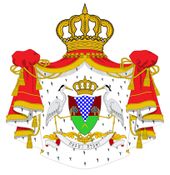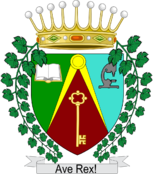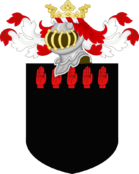Kuri of Gishabrun
| Kuri Kabanov | |
|---|---|
| Knyaz of Gishabrun | |
 | |
| Knyaz of Gishabrun | |
| Reign | 22 July 2012 - present |
| Predecessor | Kuri Kabanov as Tsar of Gishabrun |
| Chancellor of Renasia | |
| In Office | 11 March 2013 - 17 March 2015 |
| Predecessor | Office established |
| Successor | Joshua Isaac |
| Tsar of Gishabrun (before May 2010: Tsar of Moya Kravat) | |
| Reign | 5 April 2010 - 22 July 2012 |
| Predecessor | Throne created |
| Successor | Kuri Kabanov as Knyaz of Gishabrun |
| Kyng of the Slins | |
| Reign | 12 October 2011 - July 7, 2012 |
| Predecessor | Hayden Johnson As Leader of Slyndonia |
| Successor | Solomon Fyrst as Kyng of the 2nd Empyre of Slin |
| President of Erephisia | |
| In Office | October 2012 - 2013 |
| Predecessor | Billy Neil |
| Successor | Billy Neil as Curator |
| House | Vijzel |
| Religion | Judaism |
Kuri Kabanov is the founder and current Knyaz of Gishabrun. He has been the most important force in Gishabrun's political, cultural, and economic development, a role he also took on in Gishabrun SAR, Renasia, and the Tsarist Empire of Gishabrun, as its Tsar. He also served as the Chancellor of the Free State of Renasia between 2013 and 2015 - one of the two Renasian Heads of State, which represented of the Free State in international affairs alongside the Meritarch. He was instrumental to Renasia's development, most notably by introducing the Gishabruni Meritocratic Ratings system (created by him for the Tsarist Empire) as a fundamental part of Renasia's Constitutional Meritarchy, and by writing the official treaty establishing the Saint Josephsburg Economic Pact, promoting economic cooperation and harmonisation among its member states (including the Free State).
Kuri was well-known in the Microwiki Community as an amateur linguist (especially as a conlanger, most notably as the creator of the Veletan language), chess player (having participated in the 2011 and 2012 Chess Championships), and herald (having been the Chief Herald of the Tsarist Empire of Gishabrun, the Tsardom of Nolland, and the Kingdom of Natal).
Personal life
Kuri was born in Tel Aviv, Israel, to a Jewish family and lived in Israel until 2004, at which point he immigrated to Toronto, Canada, and became a naturalised citizen. As a result, he holds two macronational citizenships as well as his micronational citizenships. He has a strong interest in history, linguistics, politics, science, and engineering, and has pursued many of these interests in school and elsewhere.
Kuri's religion was Orthodox Judaism from his childhood until around 2011, when he converted to Agnosticism and soon after to Atheism. In 2016, Kuri returned to practice Orthodox Judaism.
Kuri's native language is Russian, and he is fluent in English as well. In addition to these, he is moderately fluent in French as a result of the public education system of Ontario. He also used to be fluent in Hebrew, but his immigration to Canada resulted in language attrition.
Moya Kravat and Tsarist Gishabrun
On 23 June 2009, Kuri declared himself the Tsar of the Tsardom of Moya Kravat (meaning "My Bed" in incorrectly-transliterated Russian) by claiming the territory of his bed. In April 2010 he designed the national flag of Moya Kravat, which would later become the flag of Gishabrun after a few stylistic modifications. Tsar Kuri I lead Moya Kravat to victory over the rival Principality of Annina Kravat in the brief Furnace War, which resulted in Annina Kravat being placed under Kuri's suzerainity.
Kuri, being the most active citizen of what was now known as the Tsarist Empire of Gishabrun, was the main force behind the Empire's expansion in both citizenry and claimed territories. The Tsar was very active in both internal and foreign affairs, having written Gishabrun's first constitution on July 1, 2010 as well as being the Empire's representative to the OAM after Gishabrun joined that organization on July 16, 2010.
On July 20, 2010, Kuri lead the now-established Gishabruni Army against the forces of the Unnamed Empire in the Bench War. The peace treaty that was later (17 September 2010) signed by Kuri and by the Emperor of the Unnamed Empire, Cyril I, established Kuri's suzerainity over what was renamed the Autonomous Empire of Maccrage. This treaty also paved the way to a multicameral legislative system that would dominate the Tsarist Empire's politics until its dissolution, as a new constitution was written to provide for the participation of Autonomous Regions in the government of Gishabrun, which before then was restricted to the Tsar and the Ambassadors of individual oblasts. Soon after, on August 16, 2010, Kuri created the Logogratic Organization for Security (LOB), the intelligence and secret agency of Gishabrun. The LOB was mainly involved with researching desirable candidates for Gishabrun citizenship and, under its security wing "The Maroon Guard" (later divorced from the LOB to become its own force), defended government officials from physical attacks. By this time, the hierarchy of the Gishabruni Army and Navy were established, in which Kuri was a Lieutenant and Colonel-General respectively.
Kuri, together with Cyril I, wrote the Ultramaar Convention in February 2011, a military code of conduct equivalent to the Geneva Conventions, which, despite never having been used, became the basis for the organization of the Gishabrun Army under the leadership of Cyril I. On 30 March 2011, Kuri, together with Sovetus, reformed the Council of Gishabrun to an entirely new pentacameral system, and as a result Kuri gained a variety of new offices, including the Chief of Aryol (Eagle) Clan (Russophone Jewish ethnicity), Head of the Biology Department and Professor of Micronational History in the KIOWAK, and Gishabruni Representative in the Maccragian High Council. He also became a member of the state-run company Compass Industries, and was responsible for the minting of Gishabruni coins and later the printing of Erephisian banknotes under the company's subsidiary, the Bank of Gishabrun.
On 16 May 2011, Kuri I drastically reformed the Empire's peerage system into a meritocratic system, with titles awarded based on how a citizen's rating compares to that of the highest-rated individual, but more importantly this transformed the title of Tsar from a hereditary to a meritocratic position, and formalised the meritocratic rating system, which was used only informally before then. This system later became the basis for Renasia's system of Constitutional Meritarchy.
As the Head of State, Kuri lead the negotiations with the Free State of Renasia that would result in Gishabrun becoming a Special Autonomous Region of the Free State on 22 July 2012.
Gishabrun SAR and Renasia
Upon joining Renasia, the position of Tsar was abolished and replaced by that of Knyaz, who was also Kuri. Within Renasia, he was a major influence on the new Free State constitution and especially on the establishment of the Guntanu'tl system. In December 2012, the first Renasian Chancellor elections were held, with Kuri becoming the Free State's first Chancellor, serving as head of state alongside the Meritarch Jacob Tierney. In April 2013 Kuri wrote the Meritocratic Ratings Act, which formally adapted the Gishabruni meritocratic system (used since March 2011 and codified in May 2011) to the Renasian state and cemented the Guntanu'tl system of Constitutional Meritarchy.
Meanwhile, Gishabrun SAR faced its first constitutional crisis. The Gishabruni government, which was tentatively reduced to the Elite Duma upon joining Renasia while the new constitution was being written, was required by law to hold an election on 2 June 2013, but because there were not enough candidates for an election to take place, the Gishabruni government had to be dissolved. Knyaz Kuri became an absolute monarch until 22 July, when a new constitution, written by Kuri, was adopted. This constitution made the state company KleinZav (formerly Compass Industries) identical to the Gishabruni government in a form of state capitalism, with Kuri as Knyaz also being the Chief Executive of KleinZav. In August 2013 he was the main force behind KleinZav's manufacture of Sumac Powder, a pioneering event in Renasia and micronationalism.
The Renasian Meritarch, Jacob Tierney, left micronationalism and Renasia in October 2013, returning only in May 2014. In his absence, Chancellor Kuri became the de facto leader of Renasia, as the Meritarchs Luke Hackel and later Petya d'Egtavie were fairly inactive and almost figureheads. The loss of Renasia's most productive citizen as well as external duties made this period a deeply inactive one for Kuri and Renasia, but some activities did take place. Most notable among these were the second Chancellor elections, which Kuri also won, and the 1st Constitutional Amendment, which removed the requirement for an annual review of the constitution by the Guntanu'tl.
Upon Tierney's return, activity in Renasia increased dramatically, even by other people including Kuri. Kuri wrote the text of the Saint Josephsburg Economic Agreement, which established the SJEP, an economic union of micronations focused on increasing trade. He thus became Renasia's delegate to the organisation.
On March 17th, 2015, Kuri resigned from most of his micronational positions, chief among them being Chancellor of Renasia. This announcement, together with Gishabrun SAR's impending secession, lead to the dissolution of Renasia on May 5th, 2015.
Non-Territorial Gishabrun
Since May 5th, 2015, Kuri has been the Knyaz of Gishabrun, now a non-territorial entity. Apart from a few isolated decrees throughout the years, Kuri and his court of Gishabruni nobles (known as the Gishabruni Royal Court) have been largely inactive.
Foreign Involvement
Kuri has been involved in numerous other micronations during his career, including, but not limited to:
Slinky States
Kuri joined the Slinky Empyre in 2010 as a consequence of his donation of some land as Sumac Department, and thus became a Vyceroy. He was the founder of the Eco-Slins' Party, and developed a friendship with the leader of the Empyre, Kyng Fyrst. Kuri, discontent with the Empyre's electoral system in 2011, was a major contributor to the Dissolution of the Slinky Empyre, and developed the idea of a Slinky Republyc, and was among the leaders of the Revolution in January 2011. He served in the national legislature until the Republyc's dissolution in February 2011.
In October 2011, Kuri discovered that Slyndonia, the successor to the Republyc, had been dissolved. According to the succession lists of the old Empyre, Kuri was supposed to be Kyng Second, and so Kuri adopted the title but styled himself "Kyng of the Slins" to avoid a connotation of ruling over Slinky land, as the Slinky states had all been dissolved. This claim was disputed by Sebastian Linden, who also claimed the throne, but Kuri's claim was later supported by Kyng Fyrst himself.[1] Upon the establishment of the Second Empyre of Slin, Kuri relinquished his title.
Erephisia
Kuri had a long and close relationship with the Technological Federation of Erephisia, and until recently was a close friend of its founder, Billy Neil. Kuri played a major role in Erephisian culture and politics, having been a cohost and cofounder of the famous Erephisia Cast, as well as an author of an Erephisian constitution, and even its Vice President and later its President. Relations soured between Kuri and Billy sometime in 2013 and so Kuri distanced himself from the Technological Federation. Around 2017, Kuri was briefly involved with Erephisia's successor state, the Blecc Empire.
Austenasia
Kuri served as the Empire of Austenasia's Consul in Florida from 24 December 2011 until 17 March 2015, and as its Ambassador to Canada since 6 July 2023.
New Winterdown
Kuri was influential in the culture of New Winterdown, having created its first conlang. He was also the Minister of Foreign Affairs. He left due to the nation's decision to adopt a cartoon chicken as its emperor.
Nolland and Wurtige Empire
Kuri was a relatively highly-ranked individual in Nolland, and was awarded the title Duke of Knoll. He was the Chief Herald of the Nollandish College of Arms, and designed the Nollandish coat of arms as well as the arms of peers. He was heavily involved in the Nollandish Freedom Front, at one point Nolland's official opposition party. He also became Nolland's Lord Chancellor, a position equivalent to that of a Supreme Judge, a Colonel in the Nollandish National Guard, and the Commanding Officer of the Nollandish Foreign Legion. During his time in Nolland (part of the Wurtige Empire), Kuri was also the Wurtige Minister of Industry. Kuri terminated his citizenship in Nolland on 10 August 2014 in order to join the Grand Duchy of Natal without violating Renasian double-citizenship laws.
Natal
Kuri, known locally as Daniel Vijzel, was among the highest-ranked individuals in the Grand Duchy and later Kingdom of Natal, being the Duke of New Victoria and the Grand Pensionary. As Natal's King of Arms, he designed Natal's flag, coat of arms, and other symbols. He was made a Grand Knight of the Most Excellent Order of the Wildebeest for his contributions. He was also made the Secretary of State for Home Affairs and the Grand Pensionary (Head of Government) of Natal by the Grand Duke. Kuri resigned from his government positions in Natal in 2015, and Natal itself fell into inactivity around 2019.
New Elmhurst
In September and October of 2015, Kuri was named a Colonel in the army of the United Kingdom of New Elmhurst to lead the monarchist forces in the September War. The war resulted in a monarchist victory, and Kuri subsequently withdrew from New Elmhurst.
Wyvern
Kuri was granted honourary citizenship in the Kingdom of Wyvern, and served as its Minister of Foreign Affairs in 2016. He was named Baron of Wateroord and granted membership in two orders.
Micronational Organisations
Kuri was the Tsarist Empire of Gishabrun's delegate to the Organisation of Active Micronations (and founder of the unsuccessful OAM Bank), the Grand Unified Micronational, and (briefly) to the World Micronational Alliance. He was also Renasia's main delegate to the GUM (serving as Vice Chair of the organisation at one point), and to the SJEP (he also served as the President of the SJEC between 2 October 2014 and 17 March 2015). He was also the founder of the Sovereign Order of the Open Book. Kuri is also a patron of the Micropolitan Lounge, and thus bears the postnominals MPL.
Micronational Political Views
In the micronational field, Kuri is a staunch meritocrat socially and a state capitalist economically. Not only did he develop the rating system of Constitutional Meritarchy used in Renasia (and, as Chancellor, was responsible for the ratings of all Renasian citizens), but he has also published the document "Meritocracy and Technocracy" as a member of the SOOB. He has also supported and partly developed the related Technocratic systems of the Wurtige Empire and the Technological Federation of Erephisia. As for state capitalism, he developed the "company rule" system that ran Gishabrun SAR, and was influential in the development of the Renasian state-owned company paradigm that coalesced around Multiplex Technical.
Titles, styles, honours, and arms
Titles and styles
- 1997 - 5 April 2010: Kuri Kabanov
- 5 April 2010 - May 2010: His Majesty Tsar Kuri I
- May 2010 - 22 July 2012: His Imperial Majesty Tsar Kuri I
- 22 July 2012 - present: His Elite Excellence Knyaz Kuri
Kuri's full style is: His Elite Excellence Knyaz Kuri of Gishabrun, Baron of Wateroord, Austenasian Ambassador to Canada MAO OSN KOW
Honours and Peerages
 Baron of Wateroord
Baron of Wateroord Member of the Austenasian Order
Member of the Austenasian Order Knight of the Order of the Snake Knights
Knight of the Order of the Snake Knights Knight of the Order of the Wyvern
Knight of the Order of the Wyvern
Arms
As Knyaz of Gishabrun, the seal of Gishabrun is Kuri's official symbol (albeit not a coat of arms in the traditional sense) in Gishabrun. Prior to becoming a SAR, Gishabrun was a Tsarist Empire, and had a traditional coat of arms belonging personally to the Tsar, in this case Kuri. Before then, Kuri was the Tsar of Moya Kravat, and had a different coat of arms. Kuri was also granted a coat of arms by the Tsar of Nolland for the former's status as Duke of Knoll.
-
Seal of the Knyaz of Gishabrun
-
Coat of arms of the Tsar of Gishabrun
-
Coat of arms of the Tsar of Moya Kravat
-
Coat of arms of the Duke of Knoll
References
- ↑ "Interview with Kyng "Solomon" Fyrst", The Gishabruni Heron, Retrieved 20 August 2014



